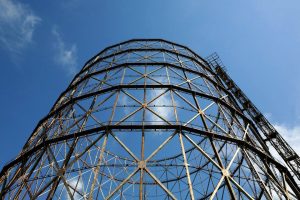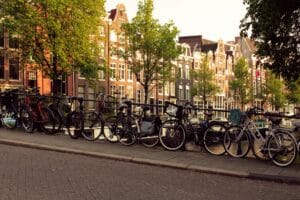This course aims to empower city-level actors as main drivers of the energy transition and enable their deeper involvement in the decision-making process.
The training will focus on three areas where cities can be particularly impactful: the uptake of renewable energy, improving the energy efficiency of Europe’s building stock, electricity metering and distribution networks.
Through this course, we provide answers to the following questions:
Action at the local and municipal level will be crucial for the realisation of the European Union’s ambitious, socially just and economy-wide decarbonisation objectives, which are currently encapsulated in the European Green Deal policy. Local and regional authorities will deliver an estimated 70% of climate mitigation measures, and are keenly aware of their role and responsibility in implementing the Green Deal. Yet, actors at the municipal level still face several barriers to transition, often arising from misalignment between city, regional, and national authorities.
The technological and regulatory complexity of EU energy sector policies and their implementation and applicability at city level present a particular challenge in this regard, made even more significant by the recent, substantial changes to much of the EU’s energy law and policy.
Against this background, this course aims to empower city-level actors and enable their deeper involvement in the decision-making process in a way that is truly reflective of cities’ fundamental importance in the realisation of the Green Deal as a whole.
Week 0: Introduction
28 April – 1 May 2025
Welcome class and introduction to the course and topics.
Week 1: Renewable Energy
1 – 8 May 2025
In the first week, we will explore how cities can best foster citizen ownership of the urban energy transition through energy sharing, and how decision-makers at municipal level can leverage EU rules on renewable energy, permitting, and zoning to efficiently decarbonise their communities.
Keywords: Renewable Energy Communities; Citizen Energy Communities; energy sharing; renewables go-to areas; permitting; zoning
Week 2: Energy Efficiency
8 – 15 May 2025
The second week of the course is devoted to the EU’s rules on energy efficiency, with a particular focus on the Energy Performance of Buildings Directive. We will discuss the new requirements on planning, retrofitting and certification that now have to be rolled out across the EU and identify the most impactful way for cities to shape this implementation process.
Keywords: Energy Performance of Buildings Directive; Building Renovation Passports; Zero-Emission Building; deep renovation; Energy Performance Certificates; one-stop-shop for energy efficiency
Week 3: Electricity Distribution Networks
15 – 22 May 2025
In the third week, we focus on distribution networks, the opportunities associated with smart metering, as well as the challenges faced by distribution system operators (DSOs) and potential obstacles to effective DSO-municipality cooperation.
Keywords: demand response; demand flexibility; smart meters; data protection; distribution network; city-DSO relations; network planning
Weeks 4 and 5: Case Study
22 May – 5 June 2025
In the final weeks, participants will have time to finalise a case study on one of three real cities, actively applying the knowledge gained to identify strengths and weaknesses of a city’s energy sector policy and providing advice on the measures and policies that could be implemented to shape the energy transition of their case study city in an impactful way. A final session in week 5 will serve as a way to discuss the solutions that participants have proposed in a Panel Debate with representatives from the case study cities.
This course is delivered in English and designed for:
Participants can choose from three levels of engagement:
The amount of time required to take this course depends on the aimed course level as well as the level of expertise in the subject prior to joining the course. For example:
After completing this course, you’ll be able to:
You’ll get a hands-on learning experience with:
At the end of the course, the participants can earn a Certificate of Attendance, a Certificate of Completion or a Certificate of Excellence, depending of their performance and engagement throughout the course.
Each year, the Florence School of Regulation – Energy and Climate (FSR Energy & Climate) awards scholarships for a wide variety of training courses targeting a broad audience of professionals and academics.
Applications will be assessed by a Selection Committee of FSR members on a yearly basis. The successful candidates will be informed after February 2024 and will be provided with all relevant information on how to enroll in the online course or residential training of their choice.
Send your application by 2 February 2025.
Discounts
Special offer for group enrolments: 10% discount from 5 participants from the same organisation
Contact: fsr.secretariat@eui.eu
Cancellation policy
Paid registration fee is non-refundable. However, registrant substitution may be made up to 20 days before the start date of the course.
**Please kindly send your certificate of current studies with the stamp of your university to FSR secretariat (fsr.secretariat@eui.eu).
The start and end dates of your studies should also be clearly mentioned on the document. Please make sure that your period of studies fully covers the training course duration.

The implementation of the EU Gas Network Codes (NC) requires an important effort from many participants of the market and sound competence and specialised resources. Join us to gain comprehensive knowledge about…

All you need to know about the power sector and power systems around the world Power system regulation is never at a rest, and this is particularly true for the…

In this new 3-day residential course from the Florence School of Regulation, we provide an immersion in the legal and technical framework of the European hydrogen sector. Over the three…

The training will focus on three areas where cities can be particularly impactful: the uptake of renewable energy, improving the energy efficiency of Europe’s building stock, electricity metering and distribution…

Clean Molecules: Hydrogen, Biogas, Biomethane, Synthetic Gas Within the EU Green Deal vision and framework, renewable, low-carbon, and even emission-negative gases have a crucial role to play in decarbonising the…

Learn the fundamental regulatory principles of the electricity and gas sectors through hands-on, real case activities and examples with instructors from national regulatory authorities from Europe and North America, the…

Learn about the fundamental regulatory principles of the transport sector through hands-on activities based on real cases and examples with instructors from academia, national regulatory authorities and ministries, the European Commission…

Crafting research with impact on energy policy and regulation LARS is a residential training addressing researchers with modeling skills who are keen to support the energy policy and regulatory debate.…

EU Electricity Network Codes & the Clean Energy Package Enter the world of electricity markets in Europe ‘Evolution of electricity markets in Europe’ is an 9-week online course in collaboration…
To meet, discuss and learn in the channel that suits you best.